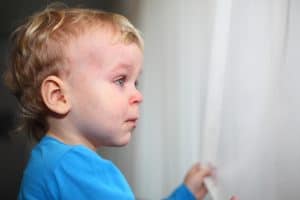
Wasn’t it nice when your infant preferred you to anyone else on the planet? Now that your child is bigger, though, and he falls apart whenever you head to the bathroom without him, his attachment seems downright obsessive. He’s experiencing separation anxiety, a developmental phase that nearly all children go through during their early years.
Why separation anxiety happens
At around 6 months, your baby begins to realize that you and he are separate, which means that you could leave him. He’s also capable of “representational thinking” now, which means that he can picture objects (like you) in his mind after they’re no longer visible. In other words, out of sight no longer means out of mind. (This is one reason why he suddenly gets such a kick out of “peekaboo.”) As your child grows into toddlerhood, he’s developing a strong drive for independence, but he still needs your undying support. All this can lead to a fear that you’ve abandoned him whenever you’re not there.
What to do
Wave bye-bye when you leave. It’s a simple tactic but one that many parents ignore. Instead, fearing the wrath of their toddler, they try to sneak out while he’s otherwise engaged. This approach may save you the pain of watching your child cry, but it can actually make his separation anxiety more severe.
Help your child look ahead.
Although your child’s ability to communicate is still hindered by his limited vocabulary, he understands much more than he can say. So, prepare him for your departure. Make sure your child knows where you are going and when you’ll be back. You may also want to give him details, such as who will be watching him and what sort of activities he can look forward to doing.
Allow your toddler and his caregiver to get engrossed in an activity before you leave. When the time comes for you to go, give your child a quick kiss goodbye and make a beeline for the door. He may still cry, but the activity can serve as a distraction soon after your departure.
Let him learn to cope. No parent wants her child to feel any unnecessary sadness, but coping with separation is one of the many stresses your child will have to learn to manage in life.
Source: Dawn Margolis, Baby Center





